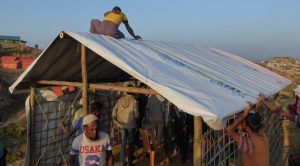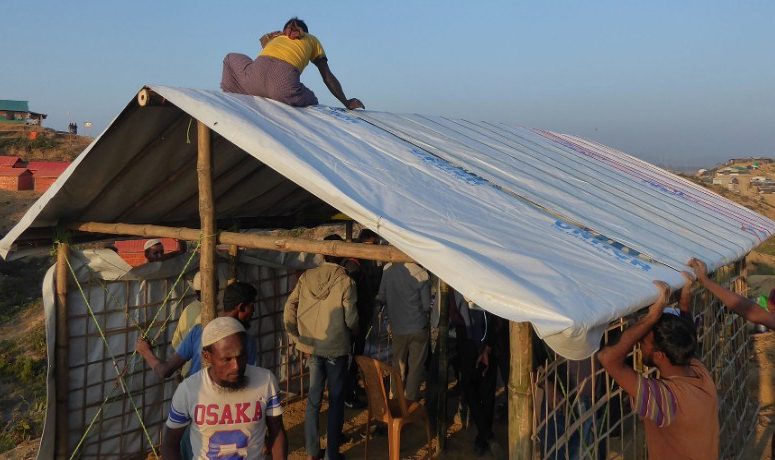As a result of conflict in Rakhine State Myanmar, since 25 August 2017 more than 708,400 people from Rohingya communities have fled their homes to seek refuge in neighbouring Bangladesh. The refugee camps, near the town of Cox’s Bazar, have grown and merged to form the largest refugee camp in the world, where more than 617,000 people now live. There are also over 15,000 Rohingyans living with local host communities and some 336,000 Bangladeshis who are also in need of humanitarian assistance as a result of the refugee influx. This is a crisis where over 1.3 million people are in need of support.
The international humanitarian community, led by the United Nations, have been working closely with the Bangladeshi Government to assess needs, develop and implement response plans and coordinate action on the ground. The refugees have access to emergency food, water, shelter and health services, however the camps are vulnerable in the monsoon season (June-September) to heavy rainfall, flooding, strong winds, cyclones and landslides. Congested living conditions continue to foster risks such as disease outbreaks and fire.
SThrough The European Rohingya Council, a team of our engineers have been providing technical support and capacity-building to UN and NGO organisations working on the ground in the Rohingya refugee camps since December 2017.trip steak cupim commodo ad pork loin bacon elit sed lorem est cow ex, dolore in. Tongue dolore in excepteur mollit beef deseru chicken capicola sausage jerky pig.
Mark Twain Project Manager
In December 2017 we decided to respond to the Rohingya crisis by providing support that filled critical skills gaps and helped build the capacity of humanitarian agencies, Bangladeshi responders, the host community and Rohingya people.
Project Summary
600,000People are living in the main Rohingya refugee camps, now the largest in the world 328km/hWinds could hit the camps in the monsoon season
6060 staff from 14 organisations trained by Arup in bamboo construction

In December 2017 we decided to respond to the Rohingya crisis by providing support that filled critical skills gaps and helped build the capacity of humanitarian agencies, Bangladeshi responders, the host community and Rohingya people.
In January 2018, we worked with humanitarian partners to enable three of our staff to visit Cox’s Bazar and provide the following:
- Two training courses run for nearly 60 local and international staff from 14 organisations in the use of bamboo for humanitarian contexts.
- Technical support to several humanitarian organisations on bamboo, shelter, community buildings, stormwater drainage and slope stability.
- Three practical workshops on constructing bamboo shelters in the field.
Since the January field mission, Arup has continued to provide remote technical support through the following:
1. A technical report on our observations on strengthening and improving: bamboo in general, shelters, community buildings, footbridges, storm-water drainage, and slope stability and retaining walls.
2. A technical guide on wind loads for shelter in camps ahead of the monsoon season, which will enable the organisations working there to understand the potential forces that a cyclone will apply to the shelters, and help them to develop appropriately strong shelters using the limited materials available.
3. Technical structural assessments of various emergency shelter solutions against wind loading, which will enable the organisations working there to understand what measures are most appropriate to improve the resistance of the shelters against wind.
4. A technical guide on the durability and treatment of bamboo for construction of the shelters in the camp, which will enable the organisations working there to implement appropriate measures to improve the lifespan of the bamboo being used.
5. A technical guide on constructing a simple emergency bamboo shelter for refugees in Cox’s Bazar.
Arup has a longstanding commitment to supporting the response to major disasters through both our Community Engagement programme and specialist International Development business.



